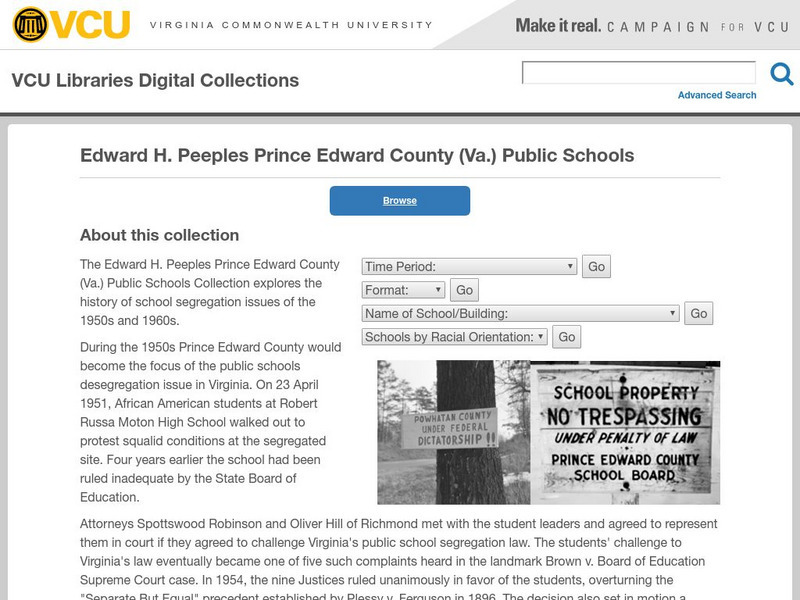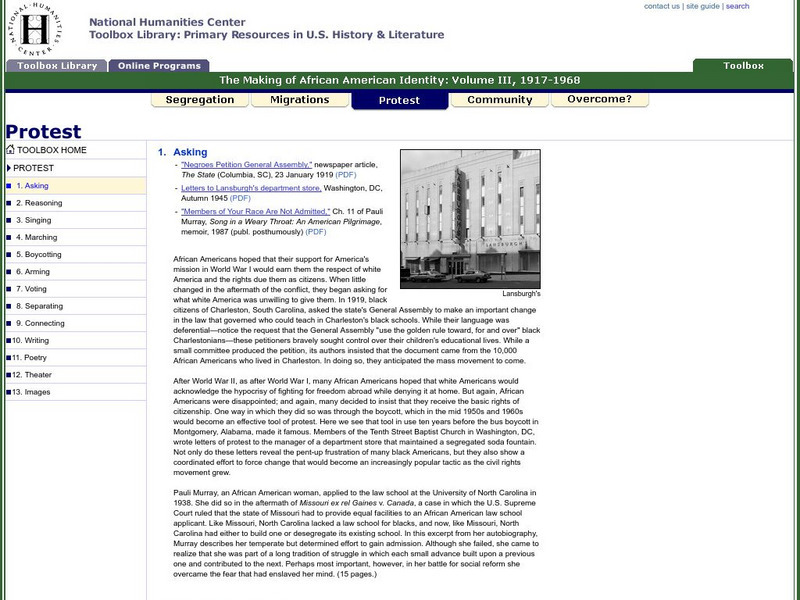National Humanities Center
National Humanities Center: Toolbox Library: Making of African American Identity: Volume Iii: Community
Series of 10 primary resources explores African American identity from 1917 to 1968, examining the changing notions of identity and affects on the definition of African American community.
Library of Congress
Loc: African American Odyssey: The Civil Rights Era
This two-part feature on African American history offers an in-depth look at the events of the 1960's civil rights movement. Discusses voting rights, laws, military segregation, freedom rides, sit-ins and the NAACP. Includes historic...
National Humanities Center
National Humanities Center: Toolbox Library: Making of African American Identity: Volume Iii, 1917 1968: Protest
A collection of 13 primary resources with questions for discussion and links to supplemental material about the various forms of protest undertaken by African Americans in pursuit of civil rights and how it helped shape identity.
Calisphere: University of California Libraries
University of California: Calisphere: 1950s 1970s: The Civil Rights Movement
Explore California's support of the Civil Rights Movement through primary source photos and documents from the 1950s.
Teaching American History
Teaching American History: Civil Rights Act of 1957
Find the text of the Civil Rights Act of 1957.
Virginia Commonwealth University
Virginia Commonwealth University: Separate but Not Equal
Telling pictures of elementary schools for Blacks and Whites during the 50s and 60s. Discusses the situation in Prince Edward County that led to the Davis v. County School Board of Prince Edward County court case.
Choices Program, Brown University
Choices: Fifty Years After the March on Washington
Comprehensive resources on the civil rights movement allows students to broaden their understanding through video and primary source material as they analyze the motivation and experience of students who joined the movement and consider...
PBS
Pbs Learning Media: American Exp: Southern Response to Civil Rights Speech, 1948
In response to Harry Truman's views of civil rights, a Democrat from Mississippi voices his displeasure in the concept of a Civil Rights Movementto grant equal freedoms to all citizens of the United States.
PBS
Pbs Learning Media: Fannie Lou Hamer Civil Rights Movement in Rural Mississippi
A collection that uses primary sources to explore Fannie Lou Hamer and the civil rights movement in rural Mississippi.
National Humanities Center
National Humanities Center: Toolbox Library: Asking, Making of African American Identity: V. 3
Attempts by African Americans to petition for their civil rights are described within this resource. This include attempts by the black citizens of Charleston to ask for civil rights by petition rather than demand them with protest.
Library of Congress
Loc: Naacp: A Century in the Fight for Freedom: Civil Rights Act of 1957
Read a brief description of the Civil Rights Act of 1957, a document adopted at the beginning of the Civil Rights movement. Click on the document to see the primary resource.
University of Groningen
American History: Outlines: Origins of the Civil Rights Movement
Overview of the beginning of the Civil Rights Movement in post World War II America.
Other
Finding Dulcina: Strom Thurmond Ends Longest Filibuster in Senate History
Read about Senator Strom Thurmond's epic filibuster in an attempt to forestall the passage of the Civil Rights Act of 1957. There is a brief biography of Thurmond and his political life, as well as information about the use of the...
Other
Ahc: Civil Rights Movement: The Surge Forward: 1954 1960
Detailed discussion of the civil rights movement between 1954-1960 including summaries of events such as Brown v. Board of Education of Topeka, Rosa Parks & the Montgomery Bus Boycott, 1955-1956, school desegregation, Sarah Keys v....
Independence Hall Association
U.s. History: Separate No Longer?
An explantion of how the Supreme Court decision in Brown v Board of Education of Topeka turned the concept of separate but equal on its head. See how they determined that the 14th Amendment was being violated when schools did not fund...
PBS
Wnet: Thirteen: The Rise and Fall of Jim Crow: Barbara Johns
The amazing story of Barbara Johns, the 16-year-old who called a strike and walk out to protest the overcrowding of Robert Russa Moton High School.
US House of Representatives
History, Art, and Archives: The Civil Rights Act of 1957
Read about the role of President Eisenhower in the impetus for the support of civil rights in 1957.
PBS
Pbs Learning Media: Decision in the Streets
Recounts the interracial Ad Hoc Committee to End Racial Discrimination's protests of racial inequality and unfair hiring practices in San Francisco in 1963-64.
Khan Academy
Khan Academy: Us History: 1945 1980: Early Steps in the Civil Rights Movement
A quick comprehension check over the early steps in the Civil Rights Movement.
Independence Hall Association
U.s. History: Rosa Parks and the Montgomery Bus Boycott
Rosa Parks started a revolution by refusing to give up her seat on a bus. Read about the Montgomery bus boycott, and see how the nonviolent actions of supporters of the Civil Rights movement succeeded in using the boycott to inspire more...


















